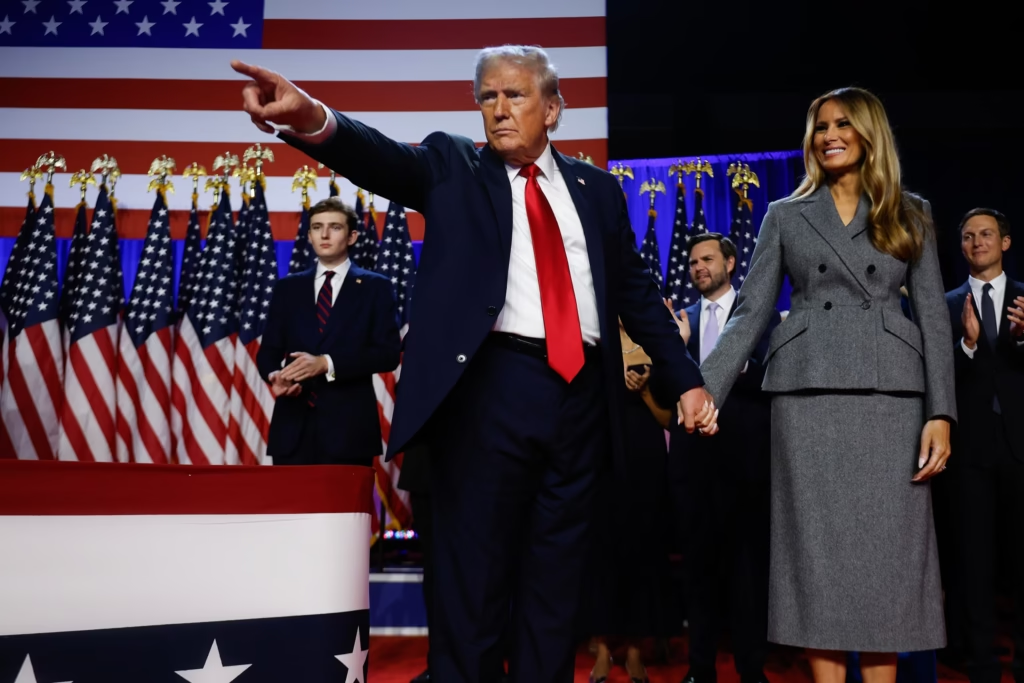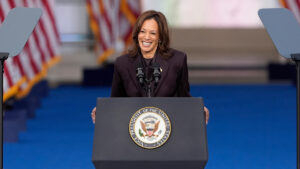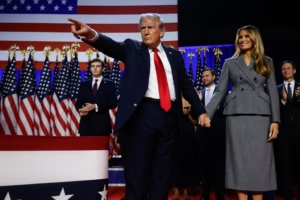Donald J. Trump, the 47th president of America, is a figure who has shaped American political discourse like few others. Known for his unorthodox fashion, brash demeanor, and controversial regulations, Trump’s time in the workplace from 2017 to 2021 became marked using fervent assistance and intense opposition. His political career has been described by means of his appeal to populism, his untraditional method of governance, and the polarizing nature of his character.
Table of Contents
A Background in Business
Born on June 14, 1946, in Queens, New York, Donald Trump grew up in a wealthy family. His father, Fred Trump, turned into a hit real estate developer who accrued a fortune building residential housing in Brooklyn and Queens. Trump attended the Wharton School of the University of Pennsylvania, where he earned a degree in economics. He took over his own family enterprise in the Nineteen Seventies and speedily increased its operations. Under his leadership, The Trump Organization undertook massive-scale actual property developments, which included the construction of luxury hotels, casinos, and golf courses.
While his enterprise ventures had been now not without controversy—Trump faced a couple of bankruptcies and criminal challenges—he maintained the public character of a self-made billionaire. His appearances on the reality TV display The Apprentice (2004-2015) in addition cemented his photograph as a hit businessman and a hard, no-nonsense choice-maker. His catchphrase, “You’re fired!” became iconic, symbolizing his leadership style.
Trump’s Political Rise
Trump’s entry into politics become a shocking one. He first flirted with the concept of going for walks in the workplace in the 1980s however remained a non-public citizen for many years. In 2015, but, he made a surprising assertion that he turned into going for walks for president as a Republican. His marketing campaign was initially viewed with skepticism, however, his populist rhetoric resonated with many Americans who felt left at the back of globalization and political elites.
Trump’s platform centered on “America First” regulations, which included retreating from worldwide agreements together with the Paris Climate Accord and the Trans-Pacific Partnership (TPP), building a wall on the U.S.-Mexico border to cut down unlawful immigration, and renegotiating change offers to advantage American workers. His difficult stance on immigration and his appeals to nationalism and financial protectionism won him a dedicated base of supporters, especially in Rust Belt states like Pennsylvania, Michigan, and Wisconsin, which helped him secure a surprise victory in the 2016 presidential election.
The Presidency
Trump’s presidency was marked by stark divisions among the American public. His policies on immigration, healthcare, and foreign affairs stirred fierce debate. Domestically, Trump drove for tax cuts, deregulation, and a repeal of the Affordable Care Act. The 2017 Tax Cuts and Jobs Act became one in of his signature legislative achievements, which slashed corporate tax rates and provided tax cuts for people, even though critics argued that it disproportionately benefited the rich.
On the worldwide stage, Trump’s “America First” approach brought about strained members of the family with conventional allies. He often criticized NATO, referred to as the withdrawal of U.S. Troops from foreign conflicts, and followed a confrontational stance in the direction of China. His administration’s reaction to the COVID-19 pandemic, however, turned into widely criticized, with many arguing that Trump downplayed the severity of the virus and didn’t put in force a coordinated country-wide reaction.
Trump’s tenure was also marked using his unrelenting use of social media, mainly Twitter, to communicate immediately with the public, bypassing traditional information outlets. His tweets regularly sparked controversy, as he used the platform to assault political warring parties, the media, and everybody he perceived as a threat to his management.
Impeachment and Aftermath
Trump’s presidency was the first in U.S. Records to be twice impeached. In 2019, he was impeached by the House of Representatives over accusations that he abused his energy by pressuring Ukraine to analyze his political rival, Joe Biden. He was acquitted by the Senate. In 2021, following the January 6 Capitol rebellion, Trump was impeached once more for incitement of revolt, though he was again acquitted through the Senate.
After dropping the 2020 election to Joe Biden, Trump and lots of his supporters falsely claimed that the election had been “stolen.” This led to the storming of the U.S. Capitol by a mob of Trump supporters in an try to overturn the consequences. The events of January 6, 2021, have forged an extended shadow over Trump’s legacy, highlighting the risks of political polarization and undermining trust in democratic institutions.
Trump’s Legacy
Donald Trump‘s effect on American politics cannot be overstated. He converted the Republican Party into a populist, nationalist pressure, reshaping the political panorama for future years. His presidency deepened political divides, but it additionally mobilized hundreds of thousands of Americans who felt disenfranchised with the aid of the political status quo.
Whether regarded as a disruptor who challenged the status quo or as a risky demagogue who undermined democratic norms, Trump’s legacy is considered one of profound polarization. As he is still a dominant parent in U.S. Politics, his effect on the destiny of American politics remains unsure, with his potential 2024 presidential bid already producing massive interest.
In sum, Donald Trump’s rise, presidency, and sub-presidential years could be studied and debated for many years to come back. His complicated legacy continues to shape the contours of American political life, and his impact is possibly to bear for generations.
Read more anmolideas






